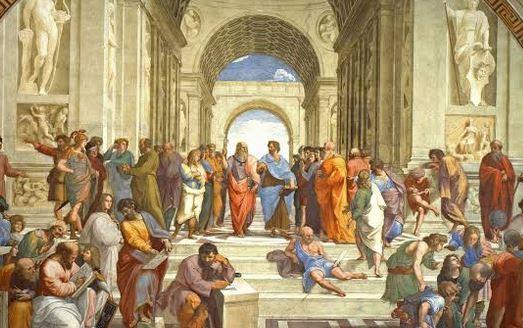Pre-Socratics

The Pre-Socratics are the early Greek philosophers who lived before Socrates and significantly influenced his thought as well as Western philosophy. The Pre-Socratics addressed the fundamental questions of the origin of the world, cosmology, metaphysics, and natural philosophy, attempting to explain the world and its phenomena in a rational and systematic way, without relying on mythological or religious explanations.
Important Pre-Socratics:
Thales of Miletus (c. 624–546 BC): Thales is considered the first known Greek philosopher and is known for his cosmology and his assumption that water is the fundamental principle (archê) of the world. He attempted to understand the universe through natural, non-mythological explanations, thus laying the foundation for Greek natural philosophy.
Anaximander (c. 610–546 BC): A student of Thales, Anaximander further developed the idea of the "primary principle." He postulated the concept of "apeiron" (the indeterminate or unlimited) as the fundamental principle from which everything in the universe arises. He was also the first to investigate the Earth theory and the origin of life through natural processes.
Anaximenes (c. 585–528 BC): Anaximenes, another philosopher of the Milesian school, viewed air (Aēr) as the primordial principle (Archê) of the world. He explained that everything in the universe can be created by the condensation and rarefaction of air into various forms (water, earth, fire).
Heraclitus of Ephesus (c. 535–475 BC): Heraclitus is known for his doctrine of the river (Panta Rhei) and the mutability of the world. He believed that the universe is constantly in a state of change and that fire is the principle that pervades and transforms everything. His famous quote is: "You cannot step into the same river twice."
Parmenides of Elea (c. 515–450 BC): Parmenides held a completely different view than Heraclitus. He taught that being is unchanging and eternal and that change and multiplicity are merely illusory. In his work "On Being," he argued that everything that exists has always been and always will be, leading to a radical ontological and metaphysical perspective.
Empedocles of Acragas (c. 495–435 BC): Empedocles formulated the theory of the four elements—earth, water, air, and fire—as the fundamental constituents of the world. He believed that these elements were related to each other in a constant interplay of love (union) and hate (separation), determining the world's form and structure.
Anaxagoras (c. 500–428 BC): Anaxagoras introduced the theory of infinite particles ("seeds" or "noumena") and claimed that everything consists of an infinite number of indivisible particles. These particles were organized by an intelligent force (nous) that governed the universe.
Democritus (c. 460–370 BC): Democritus and his teacher Leucippus developed the theory of atomism, according to which everything in the universe consists of indivisible particles, the atoms. These atoms move in empty space, and their combinations create all things in the world. This atomistic theory represented an important precursor to modern physics.
Pythagoras of Samos (c. 570–495 BC): Pythagoras was a philosopher and mathematics teacher who became known for his mathematical and mystical teachings. His most famous discovery was the Pythagorean Theorem. He believed that numbers represent the true essence of the world and the cosmos, and that the cosmos is harmonious and ordered by mathematical relationships.
Zeno of Elea (c. 490–430 BC): Zeno is known for his paradoxes, which argue against the notion of change and movement. His most famous paradoxes, such as "Achilles and the Tortoise," are thought experiments that demonstrate the apparent contradictions and paradoxes in the understanding of space, time, and movement.
Main themes of the Pre-Socratics:
Cosmology: Many Pre-Socratics attempted to explain the origins and structures of the universe. They searched for the one fundamental principle (archê) from which everything emerges and to which everything can be traced. This led to various explanations, such as water (Thales), air (Anaximenes), or the apeiron (Anaximander).
Metaphysics: Questions about being, the nature of reality, and the essence of things were intensively explored. Parmenides and Heraclitus addressed the problem of being and becoming, with Parmenides advocating the idea of a static, unchanging being, while Heraclitus emphasized constant change.
Ethics and Human Nature: Although the Pre-Socratics were primarily interested in natural philosophy, some of them also addressed questions of human nature and ethics. In a sense,
They paved the way for later philosophical reflections developed by Socrates, Plato, and Aristotle.
Epistemology: The Pre-Socratics began to ask questions about knowledge and perception. For example, Heraclitus questioned how we perceive the world and whether our perceptions correspond to reality, while Pythagoras and his followers emphasized the importance of mathematics and numbers for understanding the world.
Importance of the Pre-Socratics:
The Pre-Socratics laid the foundation for the philosophical tradition in the West. They were the first to attempt to explain the universe and human existence in a rational, scientific way, without relying on myths or gods. Their ideas and thought patterns influenced subsequent generations of philosophers, especially Socrates, Plato, and Aristotle, and shaped the development of Western philosophy, science, and metaphysics.

